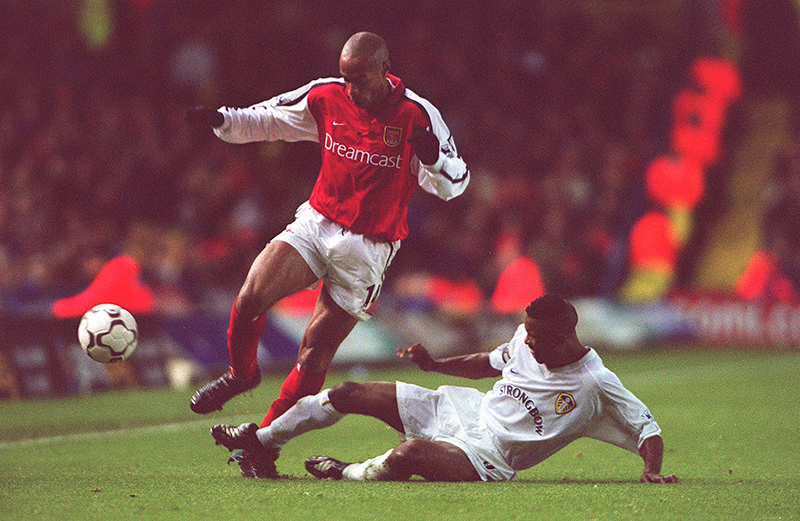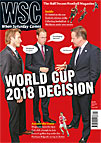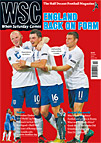
Search: ' Orlando Pirates'
Stories
 Despite the 2010 World Cup the South African Soccer League is struggling to draw crowds, writes George Thomson
Despite the 2010 World Cup the South African Soccer League is struggling to draw crowds, writes George Thomson
The Cape Town Stadium might just be the most spectacular football arena in the world. Perched on the ocean’s edge between upmarket Green Point and the tourist-friendly Victoria and Albert waterfront, the location was earmarked specifically by Sepp Blatter, who felt the dramatic backdrop of Table Mountain would provide the defining image of the 2010 World Cup finals.
 Steve Wilson explains why the 21st century is causing increasing problems for those who enjoy collecting football shirts
Steve Wilson explains why the 21st century is causing increasing problems for those who enjoy collecting football shirts
Collecting football jerseys can be a challenging hobby. For starters, purchasing your own club’s kit can’t really be included as part of your indulgence, it is more of a duty. Consequently, with the seemingly now accepted trend of changing home and away tops every season, you can expect to dish out around £80 a term before you even begin budgeting for obscure polyester gems. The internet continues to be both a help and a hindrance. While the ability to buy pretty much any shirt from anywhere in the world is a nice option, the overwhelming choice somewhat dilutes the desire to spend excessive sums of holiday money on a jersey you could feasibly pick up online for less.
Case in point: a recent visit to Athens allowed me the perfect chance to get the Panathinaikos shirt that had eluded me previously, or so I thought. After seeing scores of fake jerseys on the streets of the Plaka district I finally came across a store selling official Pana tops. The price, however, equated to over £50. At that point I had to use some common sense and walk away.
In a matter of minutes online back home several options for the same jersey could be found for a more reasonable fee. But that is just not the same. To blithely pick off peculiar shirts from in front of your computer screen feels like cheating; for me they have to be legitimately collected on your travels.
There is another issue, though, when it comes to purchasing shirts abroad. Unless you want one of the top two or three clubs from the country you are in, then your time will likely be wasted trawling the shops. Furthermore, in a sign of the Premier League’s ever expanding dominance, it often appears simpler to buy a Man Utd, Liverpool or Arsenal shirt than it is to find local jerseys.
During the summer in South Africa it was easy to find the shirts of Johannesburg’s big two, Kaizer Chiefs and Orlando Pirates, but attempting to net jerseys of any other South African club proved more difficult. There was little variety to be seen, the hangers instead weighed down with the tops of England’s leading clubs.
Even at home this is an issue. As a youngster I recall one of the highlights of trips to other parts of the country was going to their sports shops and seeing unfamiliar shirts for sale. Nowadays, a branch of JJB in Aberdeen will likely have exactly the same stock as one in Plymouth. It seems most smaller British clubs don’t even bother trying to sell on the high street anymore, or are unable to, instead selling purely through the club shop or online store.
Sadly, a startling lack of creativity at times from the manufacturers also means that few modern shirts are desirable objects – helping the trade in second-hand retro strips in the process. Aside from the globally recognised brand clubs, the effort in coming up with a unique design seems to have largely disappeared – Nike, Adidas and Puma are happy to dish out template kits with only a change in colour and badge for those teams who are unlikely to sell outside of their own catchment area.
The flipside to that is when a club truly does do something different it stands out far more. France seems to be the current home for leftfield thinking, with Marseille’s recent light blue away shirt resembling a retired uncle’s Pringle golf jersey and Lyon’s away maillot looking like the kind of wallpaper you might find in a 1970s brothel. Both are inspired designs.
Ultimately, as with any collection, the continual growth leads to the quandary of where to keep your haul. With over 200 shirts, the dream of framing each individually became unrealistic a long time ago. At present, several plastic crates house my ageing relics while others are at the mercy of moths in the loft. Unlike the technological advances that will solve this issue for music, film and literary collectors of the future I cannot see a downloadable option providing a quick-fix solution for shirt collectors any time soon.
From WSC 287 January 2011
 Paul Giess looks at the legacy of the summer's World Cup for the hosts and the future prospects for the national league
Paul Giess looks at the legacy of the summer's World Cup for the hosts and the future prospects for the national league
The surge of optimism experienced across South Africa during the 2010 World Cup having died down, daily life has returned its normal mix of strikes, unpopular government legislation and continued difficult economic conditions. At the start of the new football season there are still a handful of well-worn flags flying from cars and houses as residents cling on to memories of the few weeks when their divided nation came together as one. It remains to be seen if this will spill over into any renewed support for the 16 teams that will battle out the 2010-11 Premier Soccer League (PSL).
 In the run-up to the 2010 World Cup, Gabby Logan travelled to South Africa for BBC television's Inside Sport to talk apartheid, crime and vuvuzelas. Cameron Carter watches with interest
In the run-up to the 2010 World Cup, Gabby Logan travelled to South Africa for BBC television's Inside Sport to talk apartheid, crime and vuvuzelas. Cameron Carter watches with interest
Since discovering the continent of Africa, Europeans helped themselves to its vast mineral and human resources. In return, Africa received smallpox and football. At least the latter is going to pay off for some of the population of South Africa next year. Inside Sport (BBC1, December 7) gave a brief history lesson on football in the apartheid era and addressed the two main fears of visiting European fans – the urban crime rate and a loud plastic trumpet.